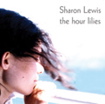
Sharon Lewis: The Hour Lilies (2006)
Some albums make you fall in love with them, and should arrive with much adulation and applause, but all too often they creep into the waiting world with no fanfare, and quietly remain there, mysterious and rare. The delightful and haunting The Hour Lilies by Sharon Lewis is one such experience. A small masterpiece of English sophistication on par with Nick Drake and Kate Bush, it is accomplished and audacious, but also reflects the sad fact that not all excellence gets noticed. Self-financed and released in minute quantities to sell at gigs, and from her website, it deserves to be more widely cherished.
"April Fool" is Joni Mitchell drenched in Mancunian showers, Morrissey in a girlish mode of reflection, piano and cello in perfect economy. The subtle hook for a small journey in restraint and refinement.
"Lost Souls" features a Fender Rhodes piano at its most effective, as Lewis glides across the lines "It's okay to be a lost soul/Take it from me/You're not alone." A near-perfect lullaby for the abandoned of every generation, this is a song of hymn-like compassion. Rarely has space been left spare with such exposed economy, strength and vulnerability in equal measures.
"Old Man Young Town" emphasizes a fate that can await any person who sticks around in one place too long. The lonely and the lost are constant companions in her tableau of characters, but are observed with consideration and empathy.
Lewis, now based in Brighton, was a vital part of the Manchester music coterie. In the early '90s she was half of Pooka who recorded four critically acclaimed albums. She has guested on Orbital, but this album of home recordings marks her solo debut. Whilst her Manchester contemporaries like John Bramwell of I Am Kloot, and later contenders like Stephen Fretwell, have reached a wider audience, she continues to plough a more narrow groove, and on the strength of this album that is hard to understand.
"Leaving on a Ship" is the song that Clifford T. Ward was always on the borders realizing. It is swirling, churning affair, full of brooding drama that echoes Tori Amos and Patrick Wolf, though it has more in common with the divinely etched miseries of Lori Carson. Wistful and nostalgic, it is one of the most aching and beautiful songs you will hear in this, or any other year; lyrically and musically mesmerizing. She informs the listener.
"Leaving on a ship/I see the cliffs getting smaller/Isn't that where I live?/How strange it is to see from a distance." The word "exquisite" was coined for songs such as this, and they are rare, as rare as this.
"Crazy October Days" is Nick Drake in autumnal, mellow androgyny. A mildly dervish-like guitar provides a floating backdrop of rare understatement, whilst "Avaddon" is Claire Hamill gliding through a Talk Talk piano track of subtle economy. Lewis isn't frightened of space, she chisels and refines it in her songs till small is big. Her adroitness and concision are staggering, and put to particularly stunning use in "Heard." Based on a poem by Manchester street poet Carol Batten, a cohort of hers from the earliest gigs; her candid, honest spirituality makes a perfect marriage to the Spartan setting Lewis creates.
"I've often searched for what I've only heard in drier times. It is the bird itself that sings. Loud rain upon the leaves is music to a bird. In drier times it is the bird itself that's heard." Were Laurie Anderson English, or if Enya took to heroin, this would be the outcome. Lewis is no mere hybrid of previous girls. She packs a profound -- at times -- distant punch, but this album weaves a rare and compelling spell. There is craft and intellect to spare here that deserves sweet success. If you favor divine melancholia, and songs are flowers of inspiration, then these are the lilies with which to furnish your mind's eye.
